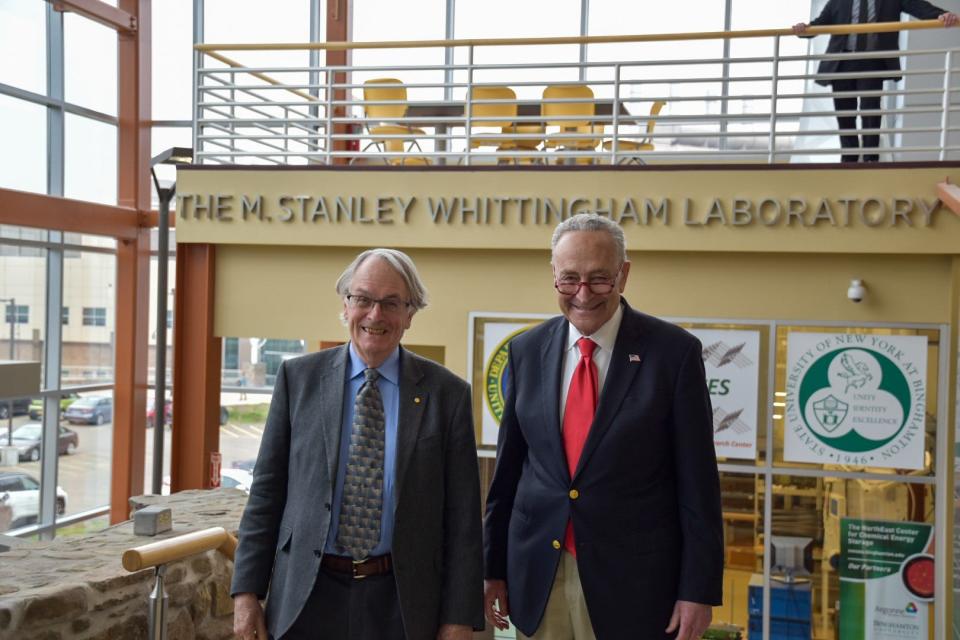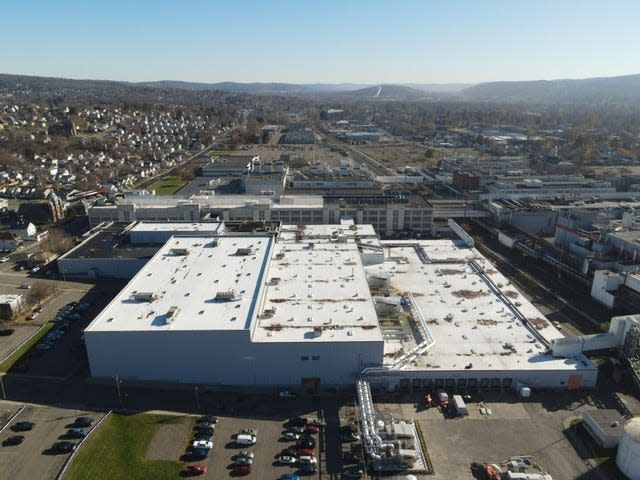Binghamton is a finalist for $160 million from National Science Foundation. What we know.
- Oops!Something went wrong.Please try again later.
- Oops!Something went wrong.Please try again later.
Binghamton University is one step closer to winning up to $160 million to jolt the Southern Tier’s growing battery economy.
Senate Majority Leader Chuck Schumer (D-NY) said Binghamton’s New Energy New York project has advanced to the final round of consideration in the National Science Foundation’s Regional “Innovation Engines” Competition, known as NSF Engines.
BU is one of just 16 projects still in contention. Over 100 hopefuls initially applied to the competition. That field was whittled down to 34 semifinalists in June.
Binghamton has experience landing major awards to create a battery manufacturing hub in the Southern Tier. Last fall, its New Energy New York project secured around $114 million in federal and state funding through the Build Back Better Regional Challenge. Schumer said the NSF Engines award would “supercharge the Southern Tier’s growth in this industry even further.”
“Binghamton is in the middle of a full transformation to become the beating heart of innovation for America’s battery belt, and now because of my CHIPS & Science bill, they are one step closer as a finalist to win up to $160 million through the National Science Foundation’s ‘Regional Innovation Engines’ Competition,” said Schumer.
“Batteries are the building blocks of modern technology and the lynchpin of the transition to a carbon-free economy, and I will keep fighting to deliver the resources needed to bring back this industry from overseas and ensure America’s clean energy future is built here in the Southern Tier and Upstate NY.”
National Science Foundation will visit Binghamton

The National Science Foundation will be visiting Binghamton University in the coming months to conduct in-person interviews and assess its proposal at ground level.
“This is fantastic news for the Binghamton team, whose innovative work has the potential to advance battery technology, drive battery production, and bolster the region’s economy,” said Binghamton University President Harvey Stenger. “I’d like to thank Senator Schumer for his steadfast efforts to raise the profile of the New Energy New York projects.”
The NSF Engines ultimately selected for funding can receive up to $160 million over a 10-year period. Projects will be assessed annually, with funding levels dependent on overall progress. Each awardee is guaranteed about $15 million the first two years to kickstart its work.
The NSF Engines program was created through the 2022 CHIPS & Science Bill. It aims to bolster American innovation in critical technologies like batteries, semiconductors, artificial intelligence, advanced wireless technologies and biotechnology, while stimulating economic growth and job creation.
More: What's next for $113M Binghamton battery project? What to know about timelines, impacts
How would the money impact the Southern Tier?
New Energy New York seeks to boost America’s domestic battery supply chain, creating a battery technology lifecycle ecosystem in Upstate NY. Binghamton and its coalition of partners would utilize the NSF Engines funding to bolster current efforts and launch new initiatives to push the industry forward.
BU’s 2022 Build Back Better award is supporting projects centered around workforce and supply chain development, innovation, and the creation of Battery-NY, a Battery Technology and Manufacturing Center hosted by Binghamton University.
"From the research labs to the factory floors to the market, the transformational NSF Engines program is giving us a unique opportunity to coalesce diverse partnerships and build a comprehensive ecosystem for battery technology innovation," said project co-director Olga Petrova, Binghamton University’s Director of Entrepreneurship & Innovation Partnerships.

Binghamton’s prominence in the industry can be traced to Distinguished Professor M. Stanley Whittingham, who won the 2019 Nobel prize in chemistry for his critical role in developing lithium-ion batteries.
A Whittingham protege, Shailesh Upreti, chairs iM3NY. The company recently started commercial production of lithium-ion battery cells in Endicott. The company is seeking a $700 million loan from the Department of Energy to power its growth in Endicott, which it estimates will create around 8,000 jobs in the industry.
“The future of our country depends on exploring new energy solutions,” said Whittingham. “With this funding, the New Energy New York Engines team will be able to further pursue these game-changing technologies and in the process, help the United States meet the economic goals of today and tomorrow.”
This article originally appeared on The Evening Tribune: Binghamton U. eyes $160 million to create battery manufacturing hub

